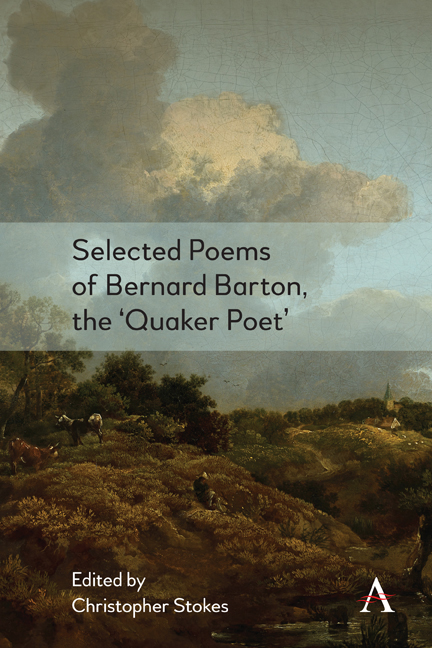109 results
Antibiotic spectrum index: A new tool comparing antibiotic use in three NICUs
-
- Journal:
- Infection Control & Hospital Epidemiology / Volume 43 / Issue 11 / November 2022
- Published online by Cambridge University Press:
- 23 November 2021, pp. 1553-1557
- Print publication:
- November 2022
-
- Article
- Export citation

Selected Poems of Bernard Barton, the 'Quaker Poet'
-
- Published by:
- Anthem Press
- Published online:
- 20 January 2022
- Print publication:
- 28 September 2020
Sonnets to Charlotte M— [1818 and 1828]
-
- Book:
- Selected Poems of Bernard Barton, the 'Quaker Poet'
- Published by:
- Anthem Press
- Published online:
- 20 January 2022
- Print publication:
- 28 September 2020, pp 46-47
-
- Chapter
- Export citation
Which Things Are a Shadow
-
- Book:
- Selected Poems of Bernard Barton, the 'Quaker Poet'
- Published by:
- Anthem Press
- Published online:
- 20 January 2022
- Print publication:
- 28 September 2020, pp 164-164
-
- Chapter
- Export citation
Stanzas, to Helen M— M—
-
- Book:
- Selected Poems of Bernard Barton, the 'Quaker Poet'
- Published by:
- Anthem Press
- Published online:
- 20 January 2022
- Print publication:
- 28 September 2020, pp 41-42
-
- Chapter
- Export citation
A Guess at the Contents of Lalla Rookh
-
- Book:
- Selected Poems of Bernard Barton, the 'Quaker Poet'
- Published by:
- Anthem Press
- Published online:
- 20 January 2022
- Print publication:
- 28 September 2020, pp 26-26
-
- Chapter
- Export citation
A Prophet’s Old Age
-
- Book:
- Selected Poems of Bernard Barton, the 'Quaker Poet'
- Published by:
- Anthem Press
- Published online:
- 20 January 2022
- Print publication:
- 28 September 2020, pp 152-153
-
- Chapter
- Export citation
Ode to an Æolian harp
-
- Book:
- Selected Poems of Bernard Barton, the 'Quaker Poet'
- Published by:
- Anthem Press
- Published online:
- 20 January 2022
- Print publication:
- 28 September 2020, pp 24-25
-
- Chapter
- Export citation
1820–25: Emergence of the ‘Quaker Poet’
-
- Book:
- Selected Poems of Bernard Barton, the 'Quaker Poet'
- Published by:
- Anthem Press
- Published online:
- 20 January 2022
- Print publication:
- 28 September 2020, pp 51-52
-
- Chapter
- Export citation
Caractacus
-
- Book:
- Selected Poems of Bernard Barton, the 'Quaker Poet'
- Published by:
- Anthem Press
- Published online:
- 20 January 2022
- Print publication:
- 28 September 2020, pp 166-168
-
- Chapter
- Export citation
The Valley of Fern
-
- Book:
- Selected Poems of Bernard Barton, the 'Quaker Poet'
- Published by:
- Anthem Press
- Published online:
- 20 January 2022
- Print publication:
- 28 September 2020, pp 55-59
-
- Chapter
- Export citation
The Yellow-Hammer; a Song, By a Suffolk Villager
-
- Book:
- Selected Poems of Bernard Barton, the 'Quaker Poet'
- Published by:
- Anthem Press
- Published online:
- 20 January 2022
- Print publication:
- 28 September 2020, pp 222-223
-
- Chapter
- Export citation
To Lydia
-
- Book:
- Selected Poems of Bernard Barton, the 'Quaker Poet'
- Published by:
- Anthem Press
- Published online:
- 20 January 2022
- Print publication:
- 28 September 2020, pp 73-73
-
- Chapter
- Export citation
To the B.B Schooner, on Seeing Her Sail Down the Deben for Liverpool
-
- Book:
- Selected Poems of Bernard Barton, the 'Quaker Poet'
- Published by:
- Anthem Press
- Published online:
- 20 January 2022
- Print publication:
- 28 September 2020, pp 219-219
-
- Chapter
- Export citation
Drab Bonnets
-
- Book:
- Selected Poems of Bernard Barton, the 'Quaker Poet'
- Published by:
- Anthem Press
- Published online:
- 20 January 2022
- Print publication:
- 28 September 2020, pp 48-50
-
- Chapter
- Export citation
Napoleon [Stanzas 28–90]
-
- Book:
- Selected Poems of Bernard Barton, the 'Quaker Poet'
- Published by:
- Anthem Press
- Published online:
- 20 January 2022
- Print publication:
- 28 September 2020, pp 88-105
-
- Chapter
- Export citation
Bibliography
-
- Book:
- Selected Poems of Bernard Barton, the 'Quaker Poet'
- Published by:
- Anthem Press
- Published online:
- 20 January 2022
- Print publication:
- 28 September 2020, pp 327-328
-
- Chapter
- Export citation
Index of Titles and First Lines
-
- Book:
- Selected Poems of Bernard Barton, the 'Quaker Poet'
- Published by:
- Anthem Press
- Published online:
- 20 January 2022
- Print publication:
- 28 September 2020, pp 329-332
-
- Chapter
- Export citation
The Vale of Tears
-
- Book:
- Selected Poems of Bernard Barton, the 'Quaker Poet'
- Published by:
- Anthem Press
- Published online:
- 20 January 2022
- Print publication:
- 28 September 2020, pp 173-174
-
- Chapter
- Export citation
Contents
-
- Book:
- Selected Poems of Bernard Barton, the 'Quaker Poet'
- Published by:
- Anthem Press
- Published online:
- 20 January 2022
- Print publication:
- 28 September 2020, pp v-viii
-
- Chapter
- Export citation



